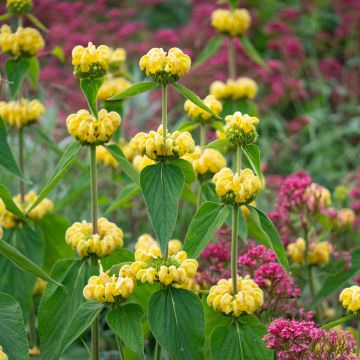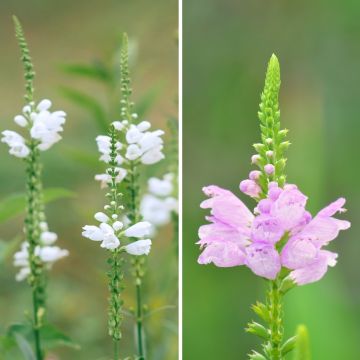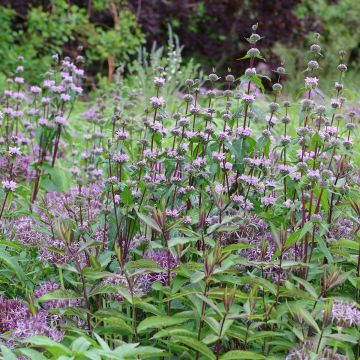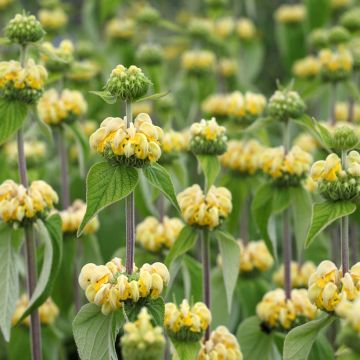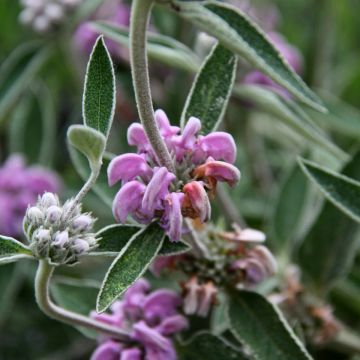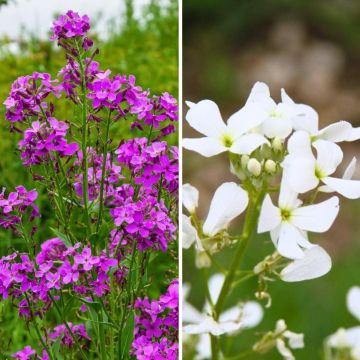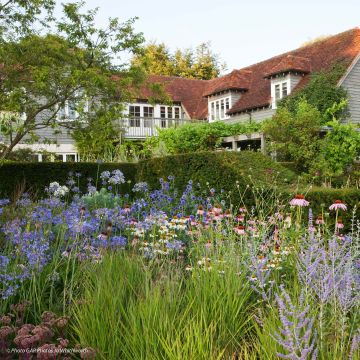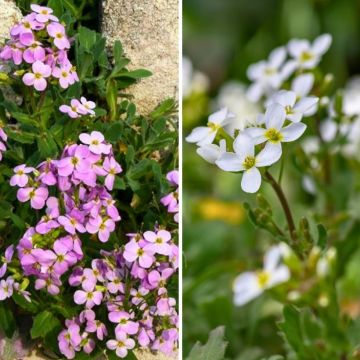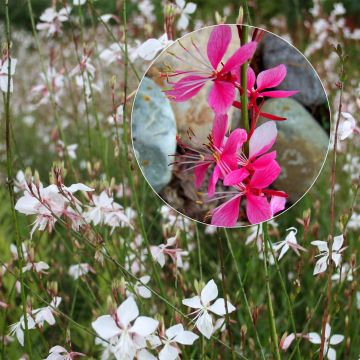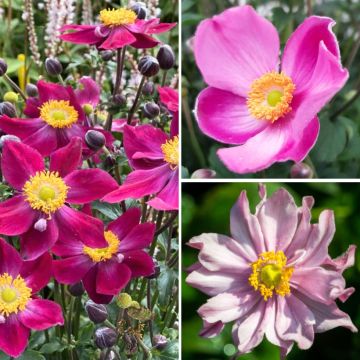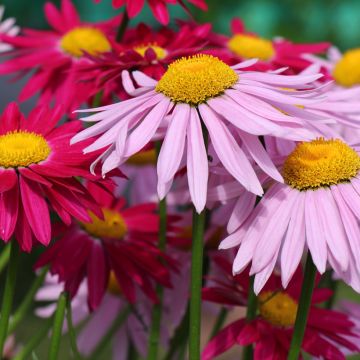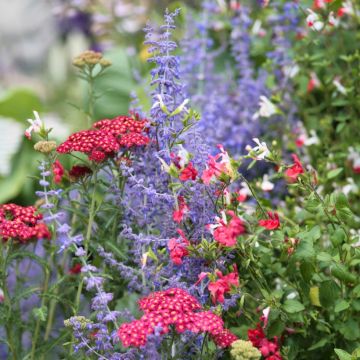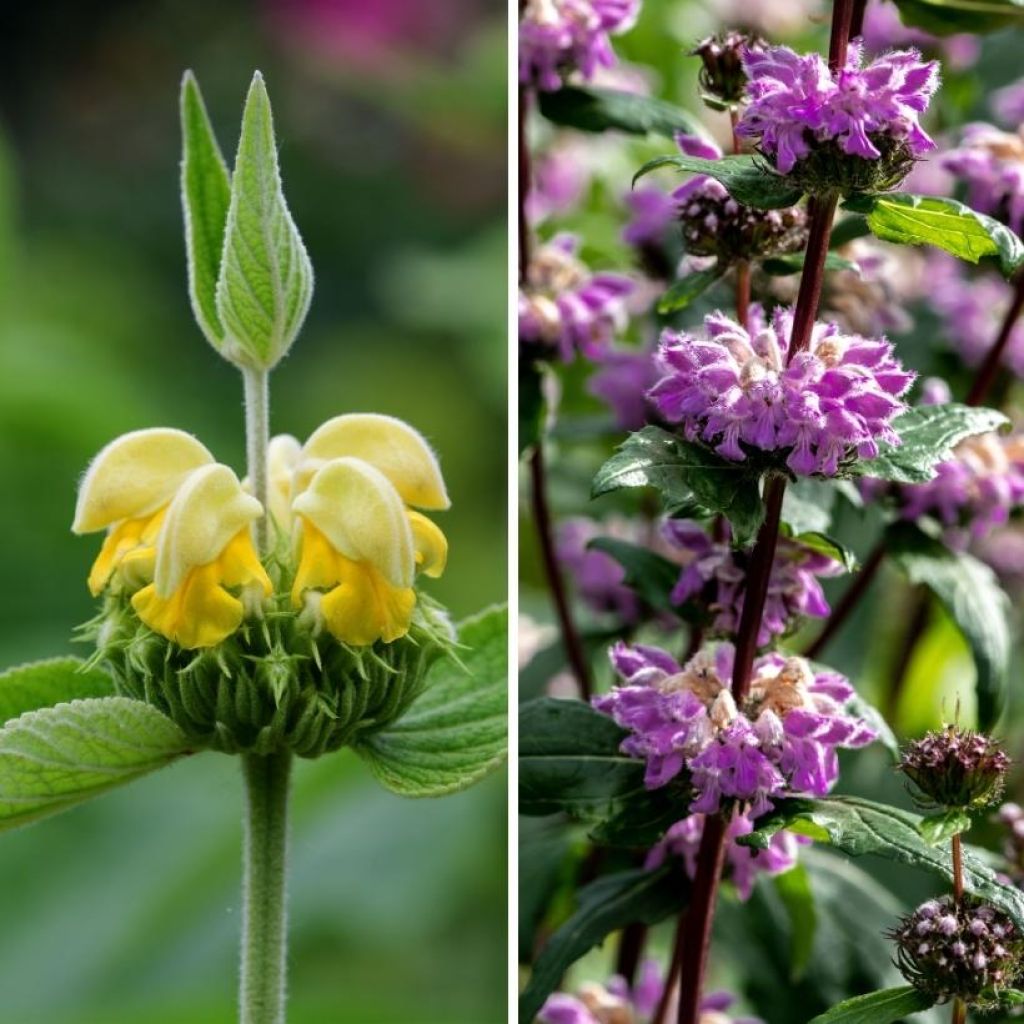

Pair of Phlomis
Pair of Phlomis
Phlomis
sage-leaf mullein, Turkish sage
Special offer!
Receive a €20 voucher for any order over €90 (excluding delivery costs, credit notes, and plastic-free options)!
1- Add your favorite plants to your cart.
2- Once you have reached €90, confirm your order (you can even choose the delivery date!).
3- As soon as your order is shipped, you will receive an email containing your voucher code, valid for 3 months (90 days).
Your voucher is unique and can only be used once, for any order with a minimum value of €20, excluding delivery costs.
Can be combined with other current offers, non-divisible and non-refundable.
Home or relay delivery (depending on size and destination)
Schedule delivery date,
and select date in basket
This plant carries a 12 months recovery warranty
More information
We guarantee the quality of our plants for a full growing cycle, and will replace at our expense any plant that fails to recover under normal climatic and planting conditions.
Would this plant suit my garden?
Set up your Plantfit profile →
Description
We offer you a pair of perennial Phlomis plants, composed of Phlomis tuberosa 'Amazone' and Phlomis russeliana, two hardy varieties that are resistant to cold weather. Their vegetation is generally deciduous, emerging from the ground each spring and drying up in autumn. These nectar-rich plants have elegant flowering in pink or pale yellow whorls that will bring a touch of originality and beautiful architecture to your flower beds in June-July. They are easy to grow in full sun or partial shade, in any well-drained soil, even limestone, but not too dry in summer.
This duo consists of:
-1 x Phlomis tuberosa 'Amazone': a variety with a tuberous crown, with violet-pink flowers on tall purplish stems reaching up to 1.20 m from the ground. Large, green, triangular, velvety, dark green leaves. This Phlomis tolerates summer drought quite well.
-1 x Phlomis russeliana: a plant with a rhizomatous crown that spreads as a ground cover, but not excessively. Its upright stems reach a height of 80 cm and bear light yellow inflorescences. Large heart-shaped, fairly bright green leaves. The basal leaves may persist in winter, depending on the climate. This variety prefers slightly moist soils in summer and readily self-seeds in the garden.
Plant this Duo of Phlomis in a sunny flower bed or one partially shaded in the afternoon. These plants like deep, rich, and well-drained soils: a mixture of compost, sand, and garden soil will suit them. Limestone is well tolerated. Space them at least 60 cm apart when planting.
These very versatile Phlomis plants will integrate well in a wild flower bed alongside Campanula rapunculoides, Euphorbia amygdaloides 'Purpurea', and Carex comans 'Bronco', as well as in a more structured scene with alliums, catmints, and bear's breeches. You can also plant them along the edge of a grove or a large shrub bed, with periwinkles, for example.
Report an error about the product description
Flowering
Foliage
Plant habit
Botanical data
Phlomis
Lamiaceae
sage-leaf mullein, Turkish sage
Cultivar or hybrid
Other Phlomis - Hardy Jerusalem sage
View all →Planting and care
Plant these phlomis in the sun or partial shade, in rich, deep, well-drained soil. Limestone is well tolerated. These very robust perennials prefer rich soil that does not dry out too much in summer, but they also survive in poorer and drier soils where they will be less spectacular. Beware of attacks from snails and slugs in spring.
Planting period
Intended location
Care
This item has not been reviewed yet - be the first to leave a review about it.
Similar products
Haven't found what you were looking for?
Hardiness is the lowest winter temperature a plant can endure without suffering serious damage or even dying. However, hardiness is affected by location (a sheltered area, such as a patio), protection (winter cover) and soil type (hardiness is improved by well-drained soil).

Photo Sharing Terms & Conditions
In order to encourage gardeners to interact and share their experiences, Promesse de fleurs offers various media enabling content to be uploaded onto its Site - in particular via the ‘Photo sharing’ module.
The User agrees to refrain from:
- Posting any content that is illegal, prejudicial, insulting, racist, inciteful to hatred, revisionist, contrary to public decency, that infringes on privacy or on the privacy rights of third parties, in particular the publicity rights of persons and goods, intellectual property rights, or the right to privacy.
- Submitting content on behalf of a third party;
- Impersonate the identity of a third party and/or publish any personal information about a third party;
In general, the User undertakes to refrain from any unethical behaviour.
All Content (in particular text, comments, files, images, photos, videos, creative works, etc.), which may be subject to property or intellectual property rights, image or other private rights, shall remain the property of the User, subject to the limited rights granted by the terms of the licence granted by Promesse de fleurs as stated below. Users are at liberty to publish or not to publish such Content on the Site, notably via the ‘Photo Sharing’ facility, and accept that this Content shall be made public and freely accessible, notably on the Internet.
Users further acknowledge, undertake to have ,and guarantee that they hold all necessary rights and permissions to publish such material on the Site, in particular with regard to the legislation in force pertaining to any privacy, property, intellectual property, image, or contractual rights, or rights of any other nature. By publishing such Content on the Site, Users acknowledge accepting full liability as publishers of the Content within the meaning of the law, and grant Promesse de fleurs, free of charge, an inclusive, worldwide licence for the said Content for the entire duration of its publication, including all reproduction, representation, up/downloading, displaying, performing, transmission, and storage rights.
Users also grant permission for their name to be linked to the Content and accept that this link may not always be made available.
By engaging in posting material, Users consent to their Content becoming automatically accessible on the Internet, in particular on other sites and/or blogs and/or web pages of the Promesse de fleurs site, including in particular social pages and the Promesse de fleurs catalogue.
Users may secure the removal of entrusted content free of charge by issuing a simple request via our contact form.
The flowering period indicated on our website applies to countries and regions located in USDA zone 8 (France, the United Kingdom, Ireland, the Netherlands, etc.)
It will vary according to where you live:
- In zones 9 to 10 (Italy, Spain, Greece, etc.), flowering will occur about 2 to 4 weeks earlier.
- In zones 6 to 7 (Germany, Poland, Slovenia, and lower mountainous regions), flowering will be delayed by 2 to 3 weeks.
- In zone 5 (Central Europe, Scandinavia), blooming will be delayed by 3 to 5 weeks.
In temperate climates, pruning of spring-flowering shrubs (forsythia, spireas, etc.) should be done just after flowering.
Pruning of summer-flowering shrubs (Indian Lilac, Perovskia, etc.) can be done in winter or spring.
In cold regions as well as with frost-sensitive plants, avoid pruning too early when severe frosts may still occur.
The planting period indicated on our website applies to countries and regions located in USDA zone 8 (France, United Kingdom, Ireland, Netherlands).
It will vary according to where you live:
- In Mediterranean zones (Marseille, Madrid, Milan, etc.), autumn and winter are the best planting periods.
- In continental zones (Strasbourg, Munich, Vienna, etc.), delay planting by 2 to 3 weeks in spring and bring it forward by 2 to 4 weeks in autumn.
- In mountainous regions (the Alps, Pyrenees, Carpathians, etc.), it is best to plant in late spring (May-June) or late summer (August-September).
The harvesting period indicated on our website applies to countries and regions in USDA zone 8 (France, England, Ireland, the Netherlands).
In colder areas (Scandinavia, Poland, Austria...) fruit and vegetable harvests are likely to be delayed by 3-4 weeks.
In warmer areas (Italy, Spain, Greece, etc.), harvesting will probably take place earlier, depending on weather conditions.
The sowing periods indicated on our website apply to countries and regions within USDA Zone 8 (France, UK, Ireland, Netherlands).
In colder areas (Scandinavia, Poland, Austria...), delay any outdoor sowing by 3-4 weeks, or sow under glass.
In warmer climes (Italy, Spain, Greece, etc.), bring outdoor sowing forward by a few weeks.






























